Know how to take risks for others
Know how to take risks for others
Know how to take risks for others
Know how to take risks for others
Know how to take risks for others
Learn from others
Learn from others
Learn from others
Let’s look beyond ourselves
Let’s look beyond ourselves
Let’s look beyond ourselves
Soothe people’s wounds
Soothe people’s wounds
Soothe people’s wounds
Be close
Be close
Be close
Forgive unkindnesses received
Forgive unkindnesses received
Forgive unkindnesses received
See those we live with in a new way
See those we live with in a new way
See those we live with in a new way
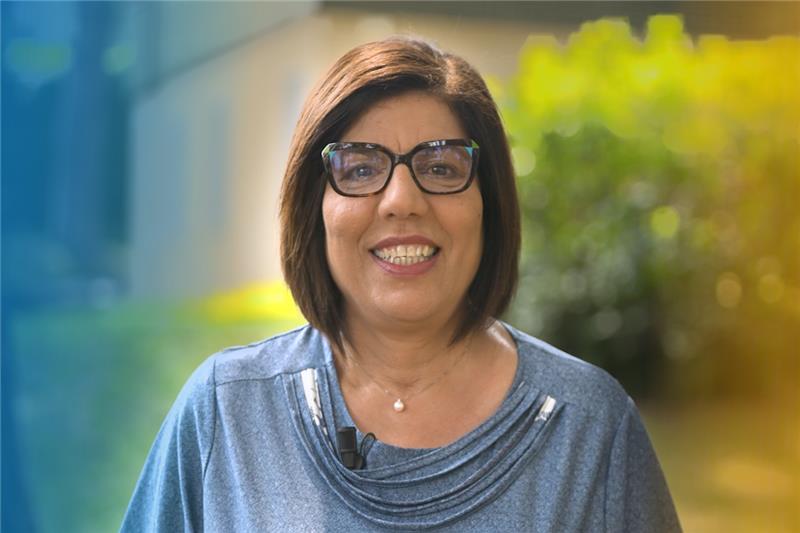
The General Assembly of the Work of Mary, the Focolare Movement, takes place every five years.
The upcoming one will take place from the 1st to the 21st of March 2026.
It is an opportunity to respond to the vocation of the Focolare Movement: to live for unity. This is one of the most important events: during the Assembly the new governing body of the Focolare Movement will be elected and the work done will provide an opportunity to talk about ideas, proposals and motions that will be the guidelines for the Movement over the next five years.
The preparation process is beginning: we are all called to do our part.
Margaret Karram, President of the Focolare Movement, explains through this video message how we can prepare ourselves in a synodal way.
Here is a video with infographics to better understand what the Assembly is, how it will be carried out and how to prepare for this important appointment.
Love gives meaning to everything
Love gives meaning to everything
Love gives meaning to everything
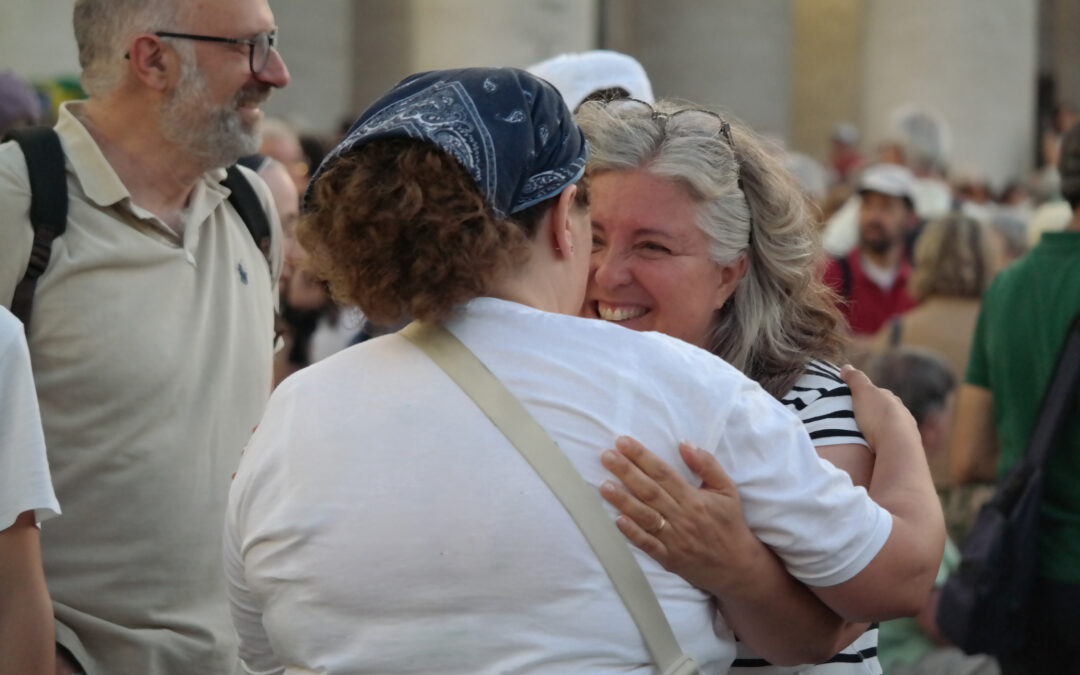
Come exiled brother, let us embrace. Wherever you are, whatever your name, whatever you do, you are my brother. What does it matter to me if nature and social conventions try to separate you from me, with names, conditions, restrictions or laws?
The heart cannot be restrained, the will knows no limits and by making an effort to love we can overcome all these divisions and reunite as a family.
Don’t you recognise me? Nature placed you elsewhere, made you different, within other borders, you may be German, Romanian, Chinese, Indian… You may be yellow, olive-skinned, black, bronze, copper-toned… but what does it matter?
What does it matter that you are from a different country? When this small, still-glowing globe consolidated, no one could have imagined that for such accidental outgrowths, people would kill each other for ages.
And even today, in the face of our political systems, do you think that nature ever asks our permission to express itself through volcanoes, earthquakes or floods? And do you think it cares about our disparities, appearances or hierarchies?
Unknown brother, love your land, your fragment of the shared crust that supports us, but do not hate mine. Under all the trappings, under the all the social classifications, no matter how codified, you are a soul that God created as a sister to mine, to that of every other person (there is only one Father) and you are like every other person who suffers and perhaps you cause suffering, who needs more than he possesses, who falters, who gets tired, hungry, thirsty, sleepy, like me, like everyone else.
“Unknown brother, love your land, your fragment of the shared crust that supports us, but do not hate mine. (…)
In you I recognize the Lord. Free yourself and even now, brothers that we are, let’s embrace. “
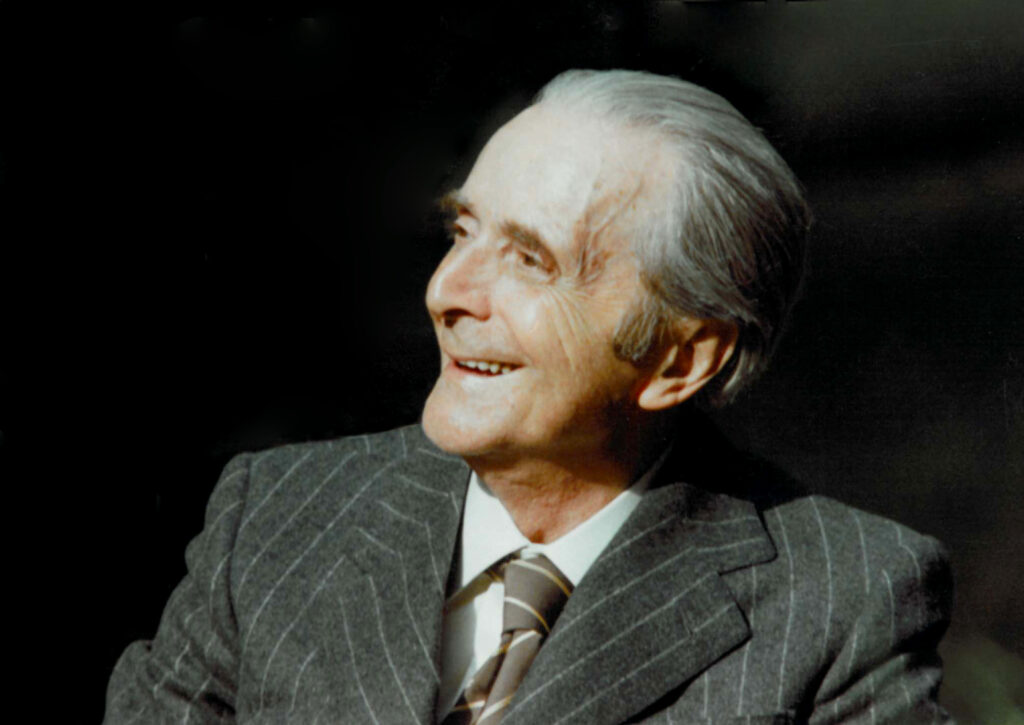
You are a poor pilgrim following a mirage. You believe yourself to be the centre of the universe and yet you are nothing more than an atom of this humanity that from millennia to millennia struggles more through sorrow than through joys.
You are a speck, brother, so let’s join forces instead of fighting. Do not be proud, do not isolate yourself, do not accentuate the marks of differentiation devised by man.
Didn’t you cry when you were born, as I did? Will you not groan when you die, as I will? Whatever its earthly shell, the soul will return to be naked, equal. So come. From beyond all seas, climates, all laws, from beyond every social, political or intellectual compartment, from beyond all boundaries (man knows only how to circumscribe, divide and isolate) come, brother.
In you I recognize the Lord. Free yourself and even now, brothers that we are, let’s embrace.
Igino Giordani
in: Rivolta cattolica, Città Nuova, 1997 (ed. Piero Gobetti, Torino, 1925)
Compiled by Elena Merli
Photo: © CM – CSC Audiovisivi
Discover God’s love throughout the day
Discover God’s love throughout the day
Discover God’s love throughout the day
Be capable of closeness
Be capable of closeness
Be capable of closeness

Martine was on the metro in one of the main European cities; all the passengers were absorbed in their phones. She thought how the people may have been connected virtually but were really trapped in isolation and said to herself, ‘Are we no longer able to look each other in the eye?’
This has become an everyday experience, especially in societies which are rich in material goods but increasingly poor in human relationships. However, the Gospel always offers its original, creative proposal, to “make all things new”[1].
In the long dialogue with the lawyer who asked Jesus what to do to inherit eternal life [2], Jesus replied with the famous parable of the Good Samaritan: a priest and a Levite, respected figures in the society of the time, saw a man assaulted by robbers and lying on the roadside, but they passed him by.
But a Samaritan while travelling came near him; and when he saw him, he was moved with pity.
To the lawyer who was very familiar with the divine commandment to love one’s neighbour [3], Jesus gave the example of a foreigner who was considered to be a schismatic and an enemy. The man saw the wounded traveller, but he allowed himself to be moved by compassion, a feeling that comes from within, from deep in the human heart. So he interrupted his journey, approached the man and took care of him.
Jesus knows that every human being is wounded by sin and his very mission is: to heal hearts with God’s mercy and gratuitous forgiveness, so that they too may be capable of closeness and sharing.
‘…To learn to be merciful like the Father, perfect like him, we must look at Jesus, the full revelation of the Father’s love… Love is the absolute value that gives meaning to everything else… and finds its highest expression in mercy. Mercy helps us to see the people we live with each day in a new light, in our family, at school, at work, without remembering their faults and mistakes. It helps us not to judge, but to forgive the wrongs we have suffered. Indeed, to forget them’ [4].
But a Samaritan while travelling came near him; and when he saw him, he was moved with pity.
The final and decisive response comes as a clear invitation: ‘Go and do likewise’[5]. This is what Jesus repeats to anyone who welcomes his Word: to become a neighbour by taking the initiative to ‘touch’ the wounds of those encountered each day along the paths of life.
To live evangelical closeness, first of all we must ask Jesus to heal us of the blindness of prejudice and indifference, which prevent us from seeing beyond ourselves.
Then, from the Samaritan, we can learn the ability for compassion which moved him to put his own life on the line. Let’s imitate his readiness to take the first step toward others, his willingness to listen to them, to make their pain our own, free from judgment and from the anxiety of ‘wasting time.’
This is what happened to a young woman from Korea: ‘I tried to help a teenager who wasn’t from my culture and whom I didn’t know well. Even though I didn’t know exactly what to do or how, I found the courage to try and to my surprise, by offering that help, I found that my own inner wounds had been healed.’
This Word offers us the golden key for living out a Christian humanism. It makes us aware of our common humanity, in which the image of God is reflected and it teaches us to courageously overcome the limits of physical and cultural ‘closeness.’ From this perspective, it becomes possible to expand the boundaries of ‘us’ to the horizon of ‘everyone’ and to rediscover the very foundations of social life.
Edited by Letizia Magri & the Word of Life Team
Foto © John-Lockwood – Unsplash
[1] Cf. Rev 21,5.
[2] Cf. Lk 10, 25-37.
[3] Dt 6,5; Lv 19,18.
[4] (C. Lubich, Word of Life, June 2002, in Words of Life, edited by Fabio Ciardi, Città Nuova, Rome, 2017, p. 659)..
[5] Lk 10,37.

Every day we see a great deal of suffering all around us and this can make us feel
overwhelmed and helpless if we do not draw upon deep human values. Sometimes, however,
the answer arrives on WhatsApp. This is whath appened to a community that tries to build
unity in a small town in Italy: “…In the hospital where I work there is a young man, a foreigner,
who is completely alone and dying. Maybe someone could spend a few minutes with him, to bring
some dignity to this situation?” This request was a shock: the responses followed quickly. The
messages from those who were with the man in his last few hours said, “At his bedside we
immediately saw that he was receiving care at the right time and that it was attentive and loving.
Really there was nothing for us to to do except be there: he was in a coma and could not benefit
from our presence.”
Was staying at the man’s bedside unnecessary and a waste of time? In those few
hours a small community, inside and outside the hospital, accompanied and brought
meaning to that situation. Who knows if a mother will be able to mourn that son in his own
country. Surely his “passing” was not in vain for those who could love that young man who
was no longer unknown. Compassion is a feeling that comes from within, from the depths
of the human heart. It makes us capable of interrupting our busy daily routine of schedules
and appointments and take the initiative to approach others and gaze at them with care,
unafraid to “touch” their wounds.
Chiara Lubich explains it with striking simplicity: “Let us imagine that we are in their
situation and treat them as we would like to be treated in their place. Are they hungry? We think – I
am hungry too. And let’s feed them. Is that person experiencing injustice? I am suffering injustice
too! And let us offer words of comfort and share their sorrows: let’s persevere until they feel
enlightened and uplifted. We will slowly see the world around us change.“ 1.
African wisdom also confirms this in a proverb from the Ivory Coast: “The person who
welcomes a stranger hosts a messenger.”
This Idea offers us a method of living out true humanism: it makes us aware of our
common humanity in which the dignity inherent in every man and woman is reflected. It
also teaches us to courageously go beyond the understanding that “closeness” is
determined by physical and cultural contexts. Thinking in this way, it is possible to expand
the boundaries of “us” to the horizon of “all” and rediscover the very foundations of social
life. When we feel we are succumbing to the impact of the suffering all around us, it is
important to draw upon the help of friends who share our views and accompany us through
life and so allow ourselves to be healed. Let’s remember, as psychiatrist-psychotherapist
Roberto Almada says, “If the good people give up the battle because of fatigue, our common
humanity will run the greatest of risks: value impoverishment.”2.
1. Chiara Lubich, The Art of Loving
2. R. Almada, Il burnout del buon samaritano, Effatà editrice, 2016
Photo: © Alexandra_Koch en Pixabay
THE IDEA OF THE MONTH is currently produced by the Focolare Movement’s “Centre for Dialogue with People of Non religious Beliefs”. It is an initiative that began in 2014 in Uruguay to share with non-believing friends the values of the Word of Life, i.e. the phrase from Scripture that members of the Movement strive to put into practice in their daily lives. Currently, THE IDEA OF THE MONTH is translated into 12 languages and distributed in more than 25 countries, with adaptations of the text according to different cultural sensitivities. dialogue4unity.focolare.org
Allow yourself to be wounded by compassion
Allow yourself to be wounded by compassion
Allow yourself to be wounded by compassion
Work for a united world
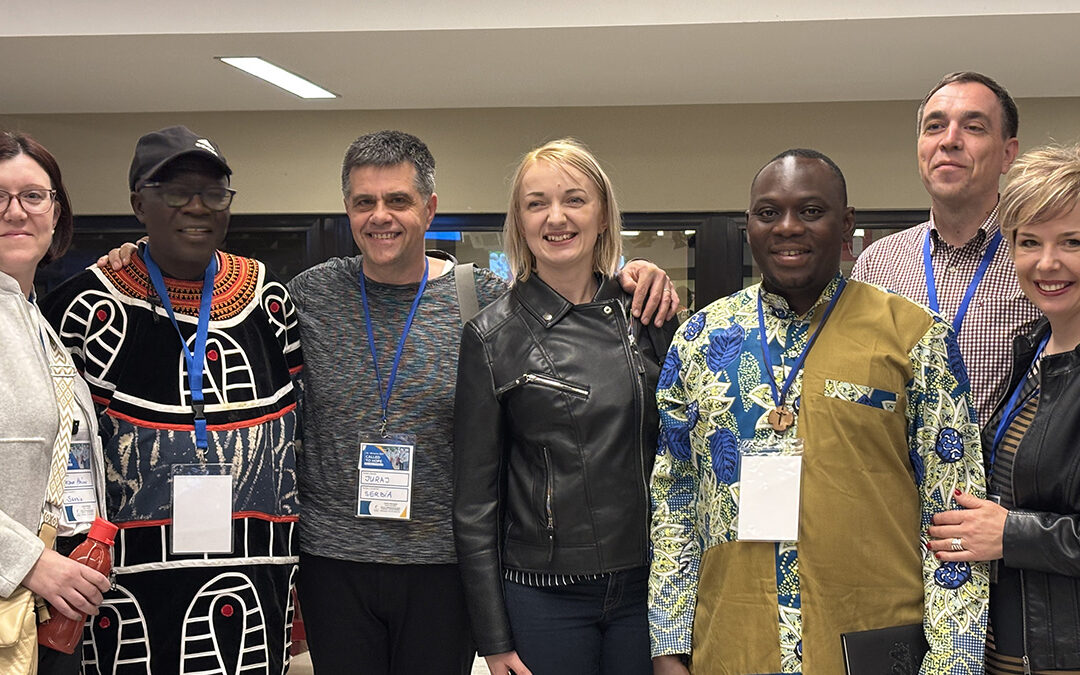
On 29th June, 1967, Pope Paul VI invited Patriarch Athenagoras to send some representatives to Rome. Since then, the leaders of the two Churches have exchanged visits: on 29th June, the feast of Saints Peter and Paul, a delegation from the Patriarchate of Constantinople comes to Rome – at times, the Patriarch himself has come; while on 30th November, the feast of Saint Andrew, a delegation from the Vatican travels to the Patriarchate on behalf of the Pope. According to Tradition, Saint Peter, bishop of Rome and Saint Andrew, founder of the episcopal see of Constantinople, were brothers. These visits are a reminder for these two Churches that see themselves as sisters, to commit to reconciliation and to strengthen the bonds of solidarity.
On this feast day, which is meaningful for the journey toward unity among the Churches, we are publishing a video with reflections gathered at the conclusion of the Conference entitled “Called to hope – Key players of dialogue” promoted by Centro Uno, the international secretariat for Christian unity of the Focolare Movement. The event brought together 250 people from 40 countries and 20 Christian Churches, with over 4000 people worldwide following it via streaming.
Turn on subtitles and pick the language you want (International Version)
Give witness to love
Be capable of loving!
Start from your heart!
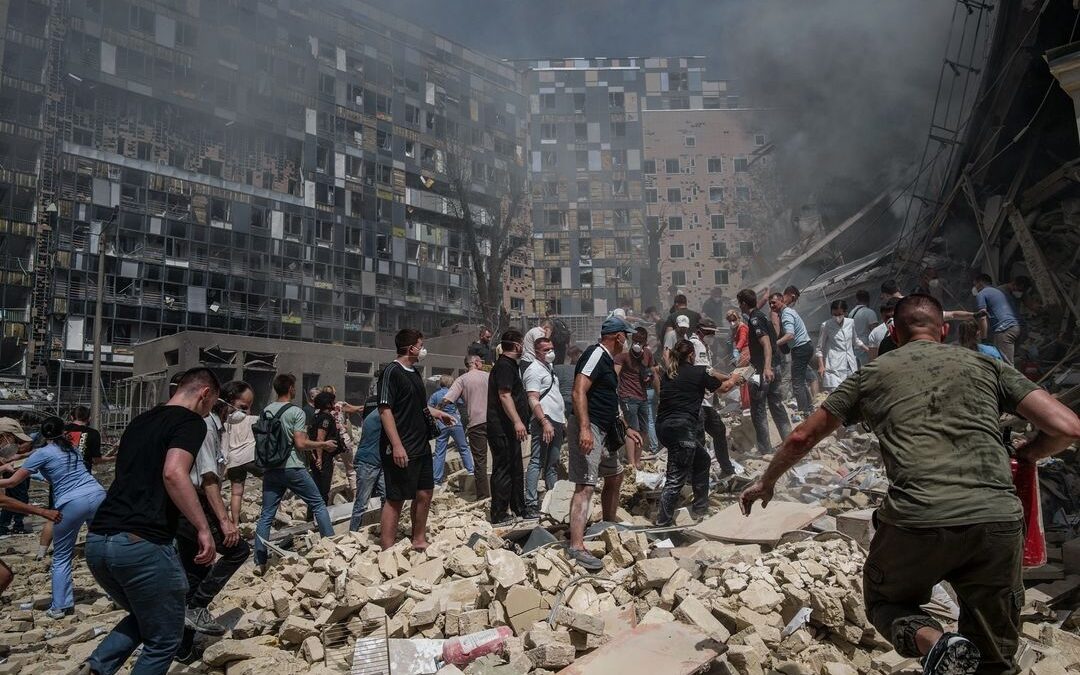
I couldn’t understand how anyone could give life to a young person, have him worn out by studies and sacrifices, in order to prepare him for an operation, in which he would have to kill strangers, unknown, innocent people and in turn, he would be killed by others to whom he had done no harm. I saw the absurdity, the stupidity and above all the sin of war: a sin made more acute by the excuses used to justify it and by the futility with which it was decided.
The Gospel, long meditated upon, taught me that to do good, not to kill was a fundamental duty; to forgive, not to take revenge. And reason itself gave me a sense of how absurd it was to engage in a conflict where victory did not go to the just, but to those with more cannons; not to justice, but to violence.
In the “radiant May” of 1915, I was called to arms. […]
So many bugles, speeches and flags! All this only deepened within me the sense of revulsion for those clashes, in which governments, entrusted with the public good, carried out their task by slaughtering the children of the people, hundreds of thousands and by destroying or allowing the destruction of the assets of the nation: the common good.
How stupid it all seemed to me! And I suffered for the millions of people, who were forced to believe in the sanctity of those murders, a sanctity also attested by clerics who blessed the cannons destined to offend God in His masterpiece of creation, to kill God in His image, to carry out fratricide among baptized brothers.
“I saw the absurdity, the stupidity
and above all the sin of war…”
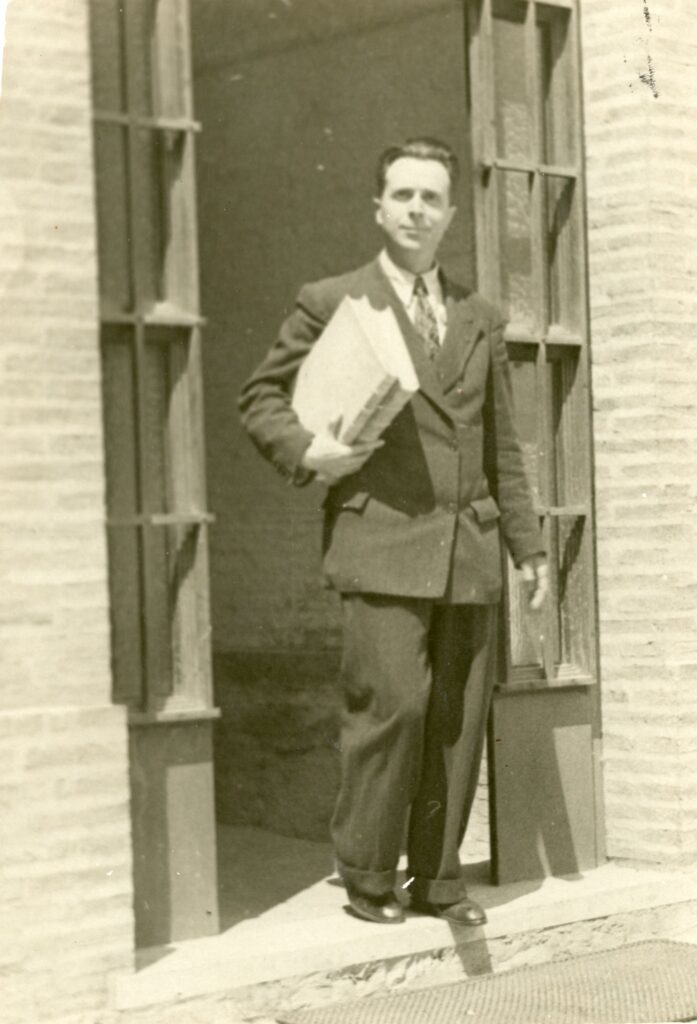
As a recruit I was sent to Modena, where there was a kind of university for the training of warriors and commanders. Coming from the world of Virgil and Dante, the study of certain manuals that taught how to deceive the enemy in order to kill him, had such an effect on me that, in an act of reckless defiance, I wrote in one of them: “Here we are learning the science of imbecility”. I had a very different concept of love of country. I understood it as love and love means service, the pursuit of good, the promotion of well-being, to provide a happier coexistence: for the growth and not for the destruction of life.
But I was young, and I did not understand the reasoning of the older generation, who didn’t really want to understand. They distracted themselves with parades and shouted slogans to numb their senses.
[…]
After a few weeks, having completed my training in Modena, I returned home briefly before departing for the front. I hugged my mother and father, my brothers and sisters (we rarely embraced in my family) and boarded the train. From the train I saw the sea for the first time, much wider than the Aniene River, it felt as though I had fulfilled one of life’s duties. After three days, I reached the trenches along the Isonzo and joined the 111th Infantry Regiment.
The trench. In it, from school I entered life, between the arms of death and cannon fire. […]
If I fired five or six shots, into the air, I did so out of necessity: I never aimed my rifle towards the enemy trenches, for fear of killing a child of God. […]
If all those days spent, in the bottom of the trenches, watching reeds and tufts of brambles and bored clouds and shining blue sky, had been spent working, we would have produced enough wealth to meet all the demands for which the war was being fought. Clearly: but that was reason and war is the opposite of reason.
Igino Giordani
Memorie di un cristiano ingenuo, Città Nuova 1994, pp.47-53
Compiled by Elena Merli
Photo: © ZU via Fotos Públicas
Listen to the voice of your conscience
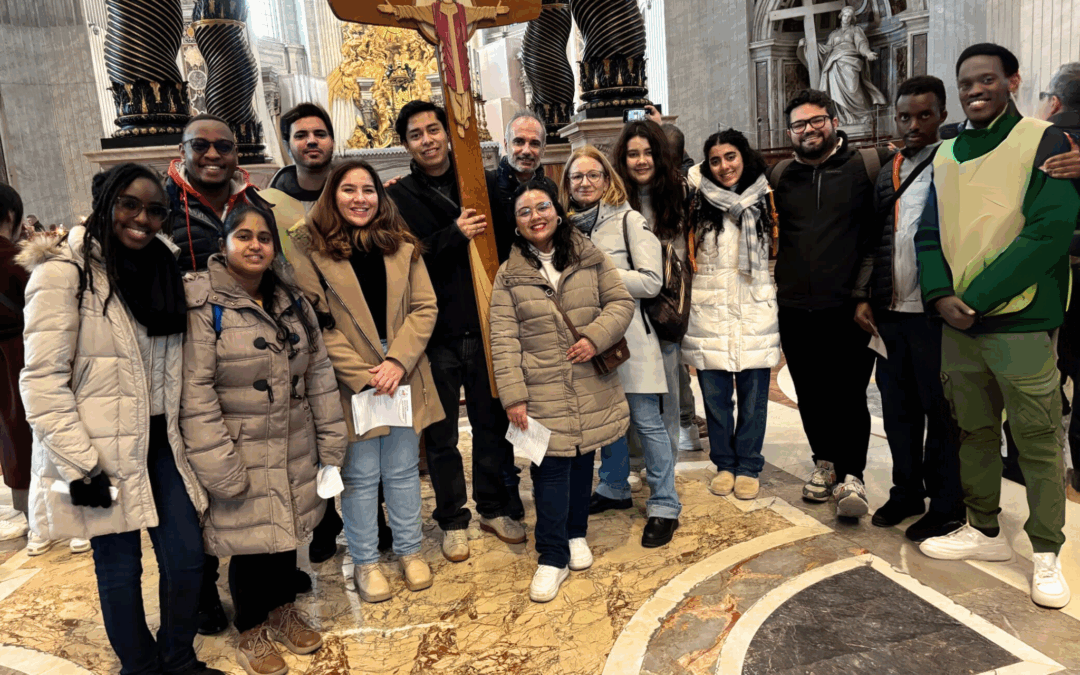
On the occasion of the Jubilee of Youth, from 29th July – 1st August 2025, the young people of the Focolare Movement are offering a special programme for fellow pilgrims: four days of spirituality, sharing, testimonies, prayer, catechesis, fun and walking together!
It is a unique opportunity to set out on a journey through places full of history and spirituality, meeting many people along the way and growing in faith and hope.
Each day is built around a key word, a stop that includes a time for reflection and prayer and a spiritual focus rooted in the Focolare charism of unity, with testimonies and songs so that the Jubilee of Youth may be lived as a journey based on 4 key ideas: pilgrimage (a journey), holy door (an opening), hope (looking forward) and reconciliation (making peace). For those who wish, there will be catechetical sessions at the Focolare meeting point led by Tommaso Bertolasi (philosopher), Anna Maria Rossi (linguist) and Luigino Bruni (economist).
The Pilgrimage to the Seven Churches
The programme follows the historical itinerary used by pilgrims since the 16th century. The Pilgrimage of the Seven Churches was designed by St. Philip Neri. It is a journey of faith and fraternal communion, made up of prayer, songs and reflections on the Christian life.
The stages of this pilgrimage are seven symbolic places in Rome: the Basilicas of: St. Sebastian, St. Paul Outside the Walls, St. Mary Major, St Peter’s, St. Laurence, the Holy Cross in Jerusalem and St. John Lateran. The total route is 20 kms. Over the centuries, thousands of young people and adults have engaged in this experience. Participants will also join the main events of the Jubilee of Youth, including: the moment of reconciliation at the Circus Maximus and the meetings with Pope Leo XIV during the vigil and at the final Mass at Torvergata which was the location of the vigil and the Youth Mass of the Jubilee of 2000. For those who can stay longer, on 4th August, there’s an opportunity to visit the International Centre of the Focolare in Rocca di Papa
This programme offers many opportunities to experience the Jubilee, to discover Rome and to live a moment of deep faith and spirituality together. Along the route, each participant will receive a Pilgrim’s Passport. In every church they visit, they’ll be invited to write a single word describing what they experienced or what struck them most. At the end, this will become a unique keepsake of their journey.
Are you ready? Safe journey!
For more information: sgmu@focolare.org – +39 338 159 3455.
Lorenzo Russo
Love is made of patience
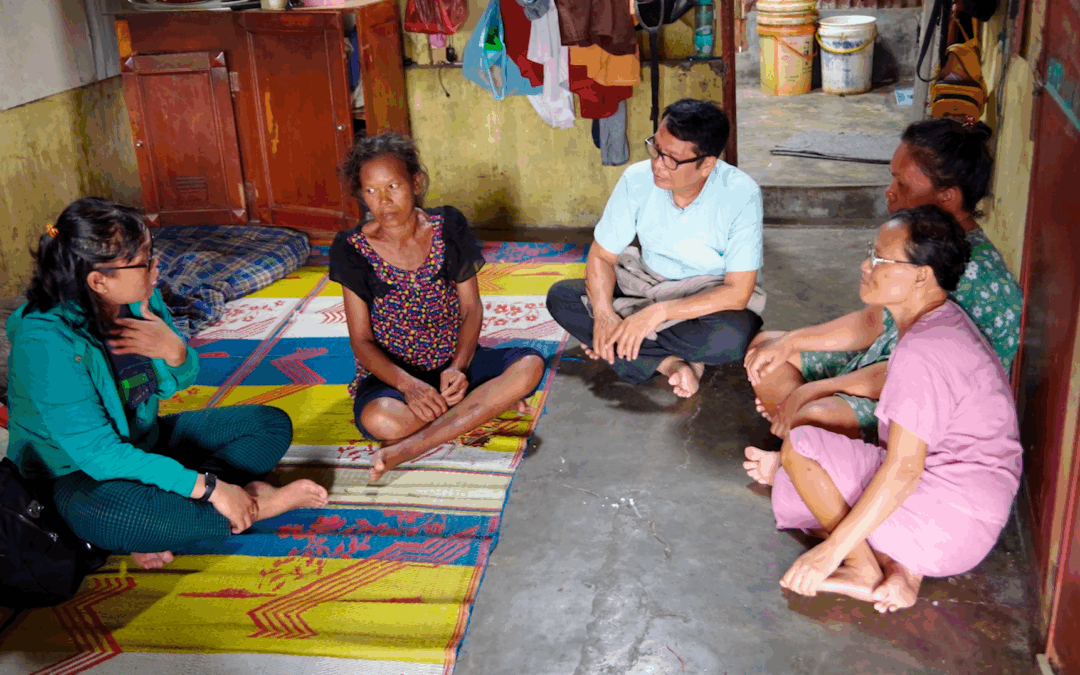
Enable subtitles and select your preferred language.
Adhere to God’s plan
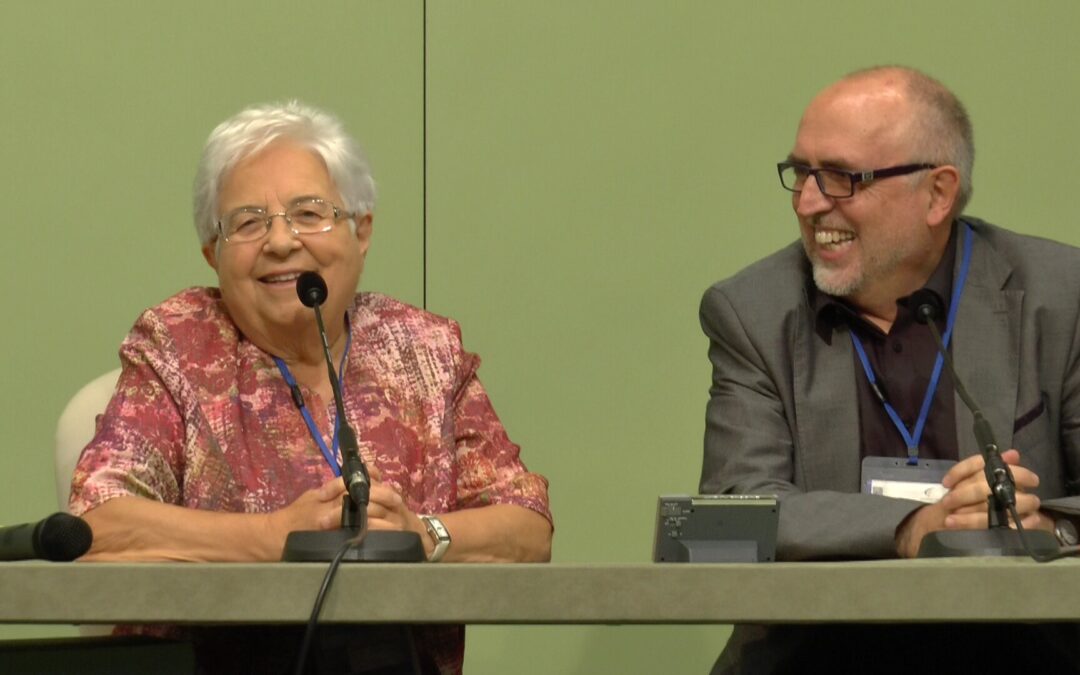
The first General Assembly of the Focolare Movement without the foundress was held in July 2008. In fact, Chiara Lubich had died a few months earlier, on the 14th of March. An air of uncertainty hung over the already emotional and question-filled atmosphere as to who should succeed Chiara in leading the Movement. It seemed obvious to think of Chiara’s first companions, now elderly, but at least some of them were still capable of leading this first post-foundation phase.
During the first session of the Assembly, there was a talk from a legal perspective on a topic relevant to the Assembly given by Carlos Clariá, an Argentinian lawyer and general councillor, and Maria Voce, for many years secretary to the central delegate Gisella Cagliari. I remember that I was sitting next to the well-known theologian Piero Coda. When they concluded their talk, I told him rather boldly: “Here is our new president”. The truth was that the way she had explained things had impressed me greatly.
Maria Voce (Emmaus) was elected on the third ballot, not without a certain “suspense”. A new stage was beginning for the Work of Mary and I, too, was elected as a councillor.
One afternoon, after the elections, as we were leaving the Mariapolis Centre in Castelgandolfo, Emmaus approached me and said more or less these words: “I thought of entrusting you with the aspect of studies and culture in the new council. You are a man of thought, and I always liked the annual reports you wrote when you were responsible for a region in Latin America.” During the following six years, my relationship with her was very simple.
At the 2014 Assembly, Emmaus was re-elected, and the participants placed their trust in me as Co-President. Since then, our relationship has strengthened enormously, without losing its simplicity. I remember that in the beginning I felt a certain apprehension at the idea of having to work side by side with a president who belonged to the generation immediately following the first one, but this feeling was short-lived. I always perceived great respect and appreciation from her, which gave me a lot of freedom. I would arrive with a bunch of new ideas, and she would support me with her wisdom and experience. In our joint presentations we would prepare the essentials together and would complement each other in a simple way. I once told her, “As opposed to what you might think, I only feel confident in expressing some creative ideas when you are by my side.” We made long and important visits to India and China, where I witnessed her ability to penetrate the most intricate situations and relate to very different key personalities.
Maria Voce, Emmaus, will go down in the history of the Focolare Movement as the first president of the post-Chiara Lubich era. If we think that when she took up her role, many of Chiara’s first companions were still alive. We can understand the “spiritual resilience” with which she carried out her work in those early years; not because they were difficult people, but simply because they were the first ones, the arms of the foundress, people who in some way had been part of the founding charism.
Emmaus will go down in the history of the Focolare Movement for having been the president of the “new set-up”, the first innovative-organisational step of the Movement in the post-Chiara era, in creative faithfulness to the charism. In her first mandate, while Chiara’s absence was felt and could have caused discouragement, Emmaus travelled the world to strengthen the members and adherents of the Focolare communities in their commitment to a more fraternal and united world – in line with the charism of the foundress. In her second mandate, she began to prepare the Movement for the inevitable “crisis” phase appearing on the horizon, which Pope Francis identified as a great opportunity. And the Argentine Pope held her in great esteem. He pointed this out to her on every occasion. This demonstrates another of her characteristics: her ecclesial spirit.
I have always admired in Emmaus her simplicity, her inner freedom, her determination and her ability to discern, in which she was greatly aided by a legal background that she made her own.
Maria Voce will go down in the history of the Movement as “Emmaus”, to evoke the centrality of Jesus in the midst of his people. This was an absolutely non-negotiable principle for her.
Thank you, Emmaus, for saying a solemn “yes” at the most difficult time in our still short history. Mary will have taken you into her arms, presented you to her Son and together they will have carried you to the bosom of the Father who was the perennial source of your inspiration.
Jesús Morán
Co-President of the Focolare Movement
Photo @ CSC Audiovisivi
Highlight the strengths of your neigbour